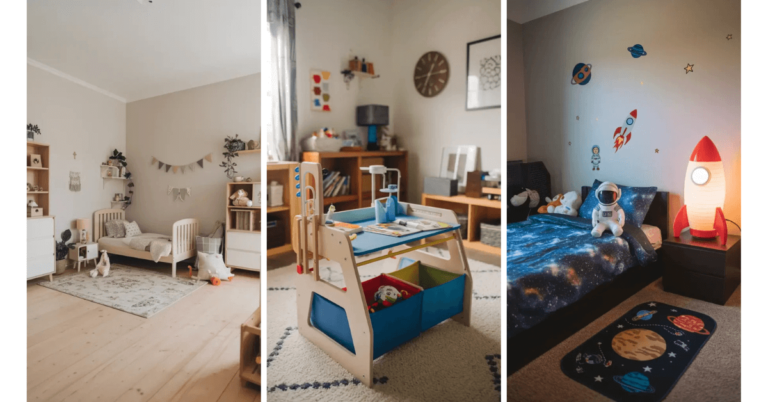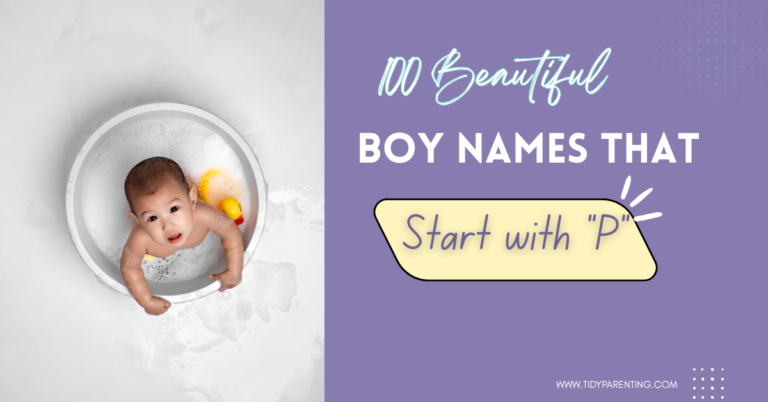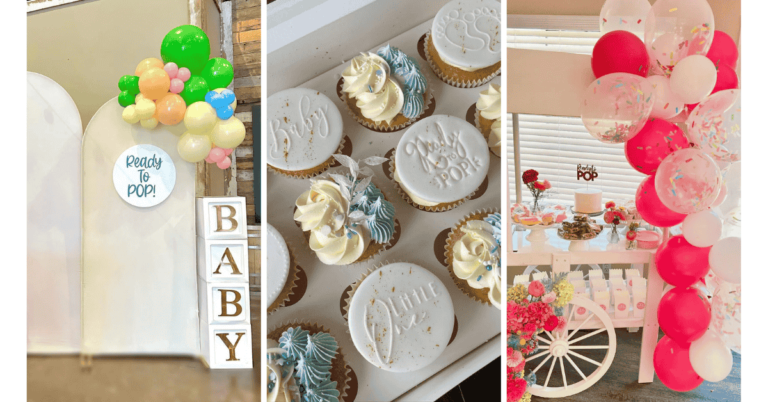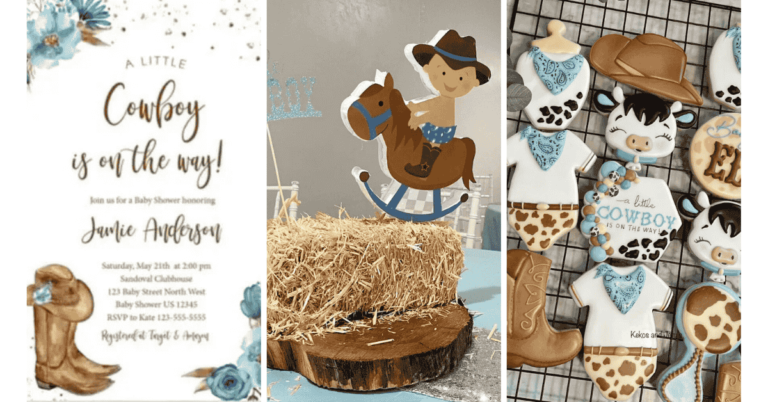when do babies say their first word
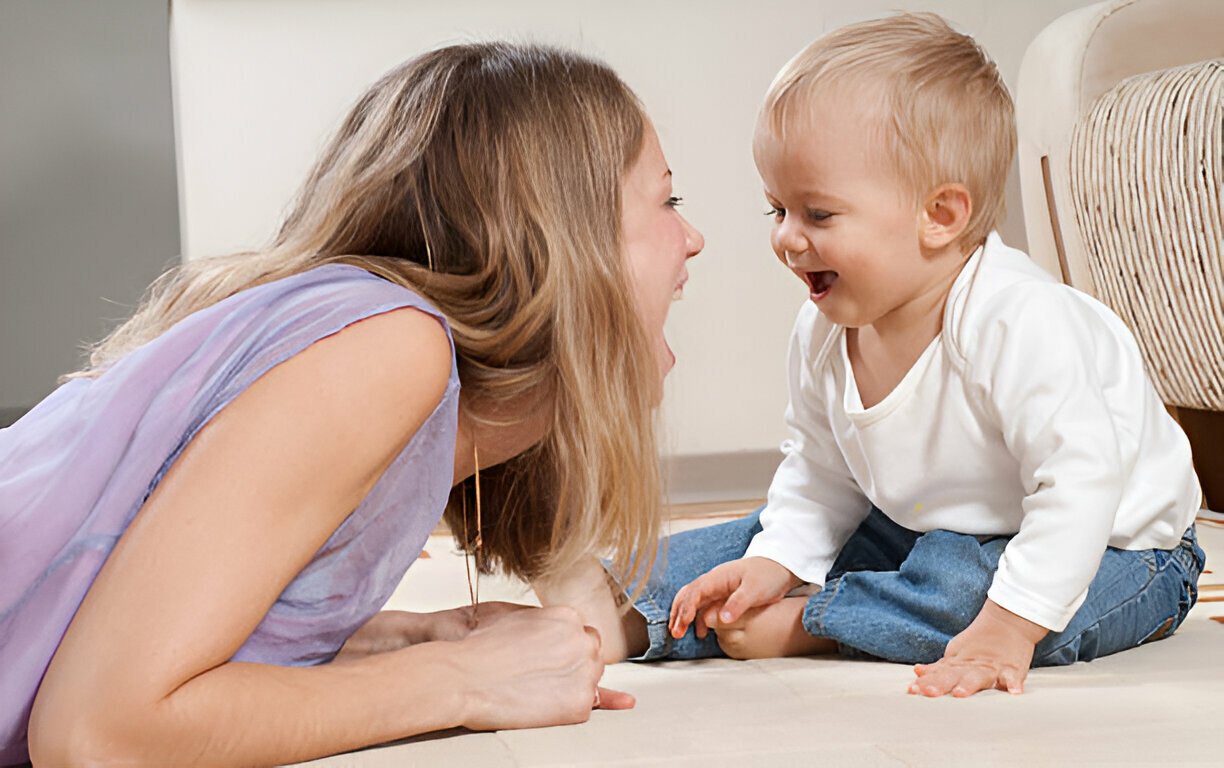
One of the most thrilling moments in parenthood is hearing your baby’s first word. That magical moment when “mama” or “dada” spills from their tiny lips for the first time is unforgettable. But when exactly do babies start talking, and what should you expect along the way?
Understanding your baby’s journey from cries and coos to meaningful words can help you support their language development and recognize important milestones. Let’s explore everything you need to know about your baby’s first words.
Early Communication: Before the First Words
Long before your baby says their first word, they’re already communicating with you in remarkable ways. From birth, babies are listening, learning, and developing the foundation for language.
The Pre-Verbal Stage (0-6 Months)
Your baby’s communication journey begins immediately after birth. During the first few months, you’ll notice:
- Crying patterns: Different cries communicate different needs—hunger, discomfort, or tiredness
- Cooing sounds: Around 2-3 months, babies start making gentle “ah-goo” sounds
- Vowel exploration: Your baby experiments with long vowel sounds like “oo,” “aa,” and “ee”
- Social smiling: By 6-8 weeks, babies smile in response to your voice and face
The Babbling Phase (4-10 Months)
Around 4-6 months, your baby enters the babbling stage. This is when real excitement begins:
- Consonant sounds emerge: You’ll hear sounds like “ba,” “da,” “ga,” and “ma”
- Repetitive babbling: Strings of sounds like “dadada” or “mamama” become common
- Jargon babbling: By 8-9 months, babies create longer sound sequences that mimic the rhythm and tone of real speech
This babbling phase is crucial for muscle development and sound experimentation. Your baby is essentially practicing the building blocks of language.
Understanding and Recognition Before Speaking
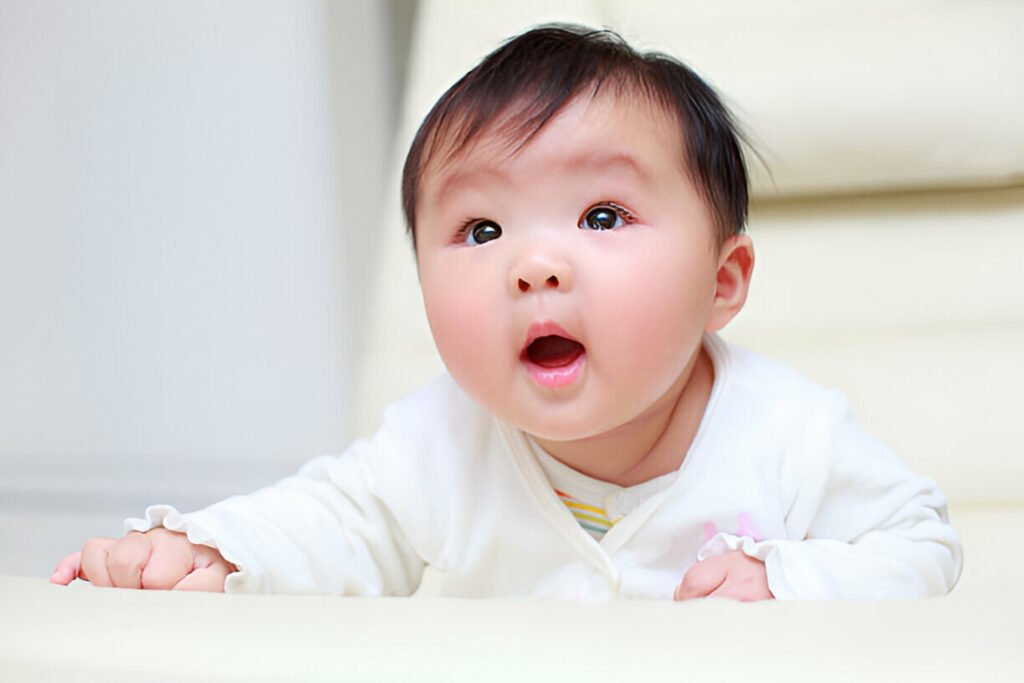
While your baby is developing their ability to make sounds, they’re also learning to understand language at a remarkable pace.
Early Recognition Milestones
- 4-6 months: Babies begin recognizing their own name as an important sound
- 6-8 months: They start understanding that their name actually refers to them
- 8-9 months: Simple words like “no” and “bye-bye” become meaningful
- 9-11 months: Babies can follow simple gestures and understand basic instructions
Your baby understands far more than they can express. This comprehension lays the groundwork for their first meaningful words.
The Magic Moment: First Words
Most babies say their first words around 12 months old, though this can vary significantly from child to child. Some babies speak their first word as early as 8 months, while others may not speak until 15-16 months.
What Counts as a First Word?
Speech pathologists look for four key criteria when determining if a sound counts as a first word:
Intentional: Your baby is purposefully trying to communicate with you, often accompanied by eye contact or gestures.
Consistent: They say the word the same way each time, even if it doesn’t sound exactly like the adult version.
Contextual: The word is used appropriately for the situation or object.
Spontaneous: Your baby says the word on their own, not just imitating you.
Common First Words
The most frequent first words include:
- “Mama” and “Dada”: Often the earliest words, though babies may not initially connect these sounds to specific parents
- Greetings: “Hi” and “bye-bye” are popular because they’re used frequently and have clear social purposes
- Simple requests: “More,” “up,” or “milk”
- Favorite objects: “Ball,” “book,” or “car”
- Animal sounds: “Moo,” “woof,” or “meow” count as words when used consistently
Remember, your baby’s pronunciation won’t be perfect. “Ball” might sound like “ba,” and “water” might come out as “wa-wa.” As long as they use these sounds consistently and meaningfully, they count as real words.
The Language Explosion: Vocabulary Growth
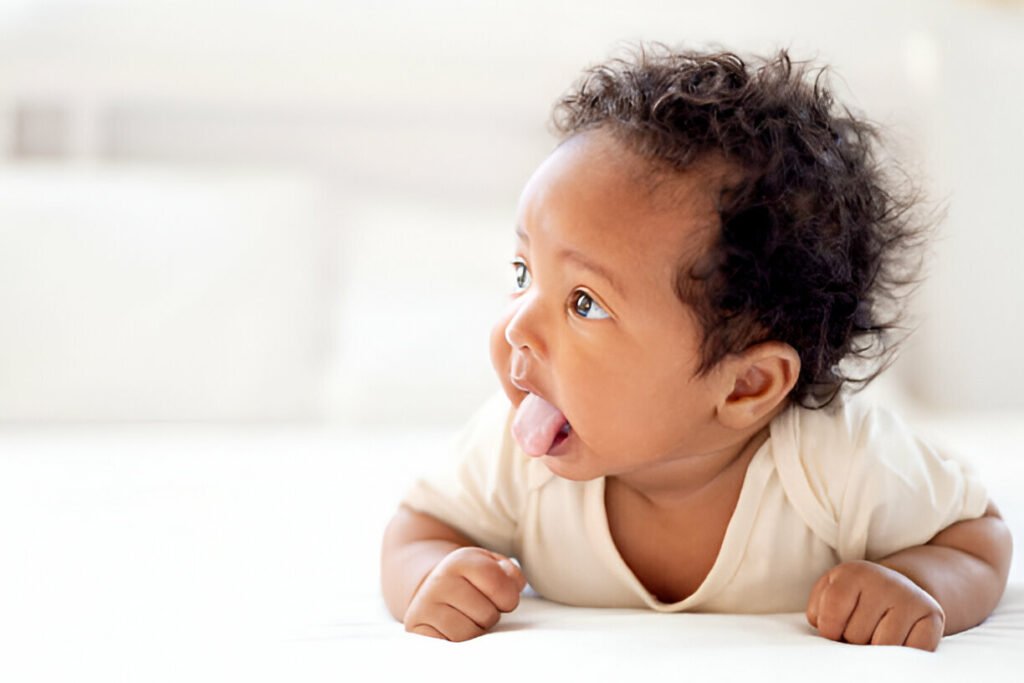
After those first few words, language development often follows a predictable pattern, though every child progresses at their own pace.
13-18 Months: Slow and Steady
During this period, vocabulary typically grows slowly, with babies adding just a few new words each month. They might have 5-20 words by 18 months. This slow growth is completely normal and expected.
19-24 Months: The Word Explosion
Around 19-20 months, many toddlers experience what linguists call a “language explosion.” Suddenly, they begin learning new words at an incredible rate—sometimes as many as nine words per day!
This dramatic acceleration happens because:
- Their brains have matured enough to make rapid connections
- They understand that everything has a name
- They become motivated to communicate more complex ideas
By their second birthday, most children have vocabularies of 50-200 words and begin combining words into simple two-word phrases like “more milk” or “daddy go.”
Encouraging Your Baby’s Language Development
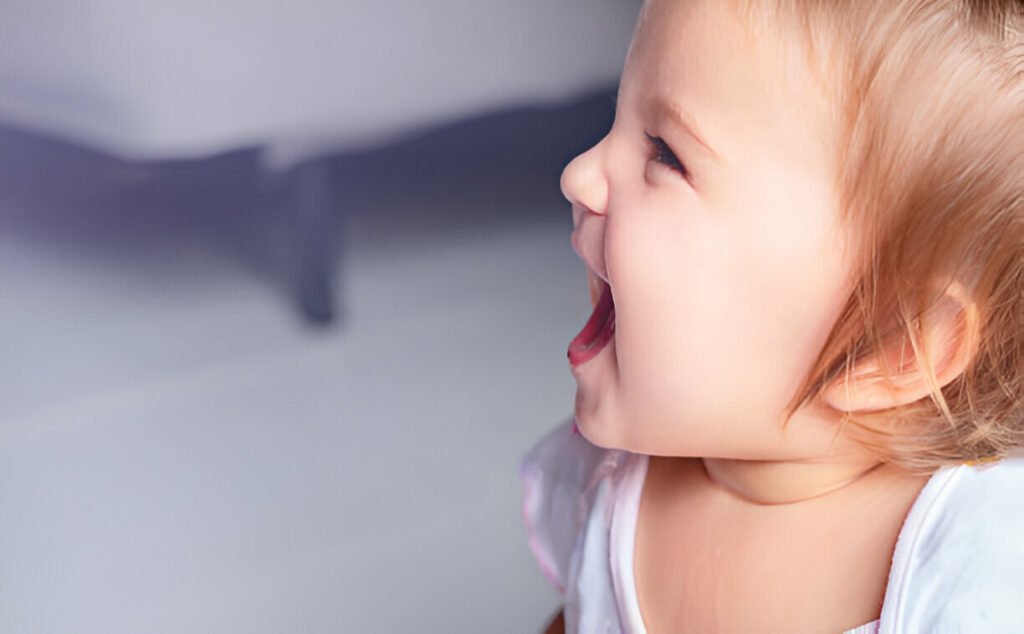
You play a crucial role in supporting your baby’s language development. Here are evidence-based strategies to help:
Talk Throughout the Day
Narrate your daily activities: “Now we’re changing your diaper,” or “Let’s put on your red shirt.” This constant exposure to language helps your baby learn new words and understand how language works.
Respond to All Communication Attempts
When your baby babbles, coos, or gestures, respond as if they’re having a real conversation. This back-and-forth interaction teaches them that communication is a two-way process.
Read Together Daily
Reading to your baby from birth provides rich language exposure. Choose books with simple, repetitive text and bright pictures. Don’t worry if your baby doesn’t sit still—they’re still absorbing the language patterns.
Sing Songs and Nursery Rhymes
Music and rhythm help babies learn language patterns. Nursery rhymes are particularly beneficial because they contain the natural rhythm and stress patterns of language.
Expand on Their Attempts
When your baby says “ba” for ball, respond with “Yes, that’s a ball! A red ball!” This technique, called expansion, helps them learn correct pronunciation and grammar naturally.
Limit Screen Time
While some educational programs can be beneficial, face-to-face interaction is far more effective for language development. Screens can’t respond to your baby’s specific interests and attempts at communication.
When to Seek Professional Help
While babies develop at different rates, certain signs may indicate the need for professional evaluation:
Red Flags by Age
By 12 months:
- No babbling or attempts at communication
- No response to their name
- No use of gestures like pointing or waving
By 18 months:
- No spoken words
- Difficulty following simple instructions
- Loss of previously acquired skills
By 24 months:
- Fewer than 50 words
- No two-word combinations
- Difficulty being understood by family members
When to Take Action
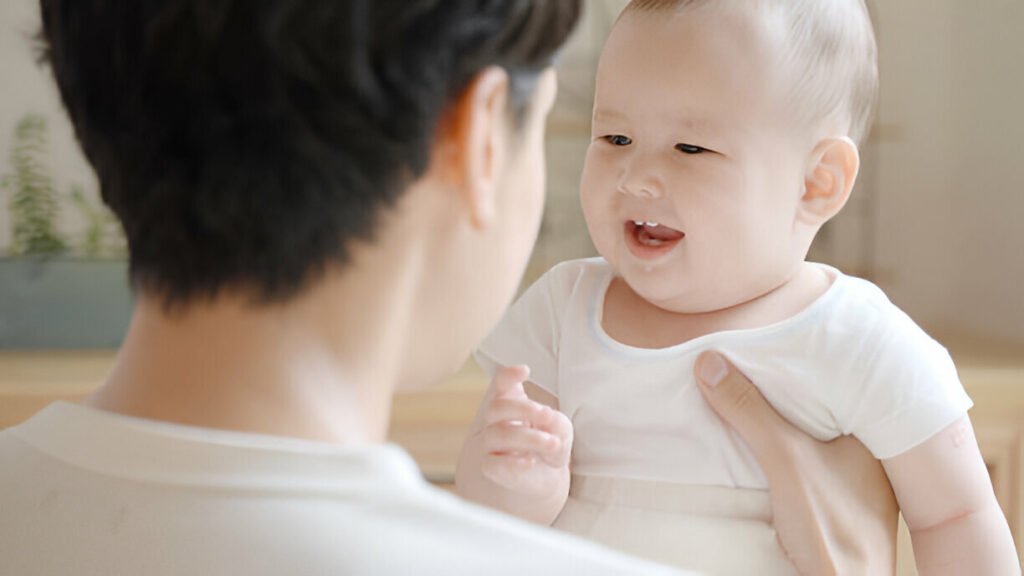
If you notice any concerning signs, don’t adopt a “wait and see” approach. Early intervention can make a significant difference in your child’s language development.
Start with:
- Hearing evaluation: Ensure your baby can hear properly, as hearing loss can significantly impact language development
- Pediatric consultation: Discuss your concerns with your child’s doctor
- Speech-language pathologist: These professionals specialize in communication development and can provide targeted strategies
Supporting Your Baby’s Unique Journey
Every baby’s path to first words is unique. Some children are early talkers, while others focus their energy on physical development like walking or climbing. Both approaches are perfectly normal.
The key is to provide a rich language environment filled with love, patience, and plenty of opportunities for communication. Celebrate each small step—whether it’s a new babbling sound, a gesture, or that magical first word.
Remember that your baby is constantly learning from you. Your enthusiasm for communication, your patient responses to their attempts, and your consistent exposure to language all contribute to their developing skills.


